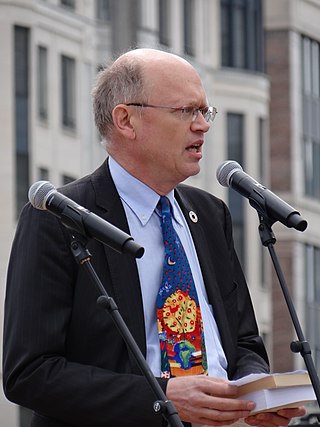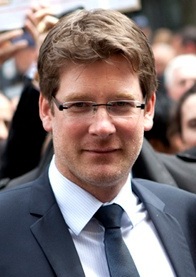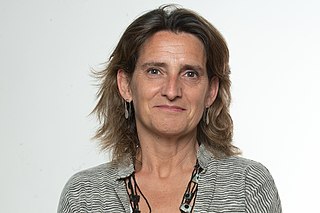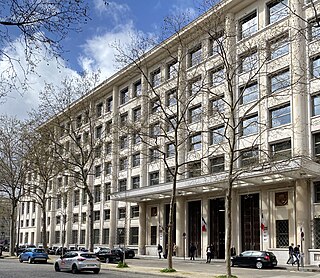
The French Development Agency is a public financial institution that implements the policy defined by the French Government. It works to fight poverty and promote sustainable development. This public institution is active in Africa, Asia, the Middle East, Latin America, the Caribbean and the French overseas territories, where it finances and supports projects that improve living conditions for populations, promote economic growth and protect the planet.

Kathleen Van Brempt, is a Belgian social-democratic politician and member of Vooruit. She currently serves as Member of the European Parliament (MEP) as part of the Party of European Socialists and is leader of the local branch of her party in Antwerp.

Jean-Pascal van Ypersele de Strihou is a Belgian academic climatologist. He is a professor of Environmental Sciences at the UCLouvain (Belgium). As a previous vice-chair of the IPCC, Van Yp is one of the forerunners of climate change mitigation through strong decrease of fossil fuel consumption.

Pascal Canfin is a French politician of La République en marche (LREM) who has been serving as a Member of the European Parliament (EUP) since 2019. In the 2019 elections for the UE Parliament, he was elected in the list of Renew Europe group and serves as chair of the Environment, Public Health and Food Safety Committee; following his initiative, the European Parliament declares in December 2019 a "climate state of emergency"

Karen Christiana Figueres Olsen is a Costa Rican diplomat who has led national, international and multilateral policy negotiations. She was appointed Executive Secretary of the UN Framework Convention on Climate Change (UNFCCC) in July 2010, six months after the failed COP15 in Copenhagen. During the next six years she worked to rebuild the global climate change negotiating process, leading to the 2015 Paris Agreement, widely recognized as a historic achievement.

María Aránzazu "Arancha" González Laya is a Spanish lawyer who served as Minister of Foreign Affairs, European Union and Cooperation in the Spanish government of Prime Minister Pedro Sánchez from 2020 to 2021. Currently, González is the dean of the Paris School of International Affairs at the elite French university Sciences Po.

Marion Guillou is a French scientist specialized in global food security.

The 2015 United Nations Climate Change Conference, COP 21 or CMP 11 was held in Paris, France, from 30 November to 12 December 2015. It was the 21st yearly session of the Conference of the Parties (COP) to the 1992 United Nations Framework Convention on Climate Change (UNFCCC) and the 11th session of the Meeting of the Parties (CMP) to the 1997 Kyoto Protocol.

The French Commission on renewal and ethics in public life, nicknamed Jospin commission, was a think tank established in 2012 by President François Hollande to provide reforms in public life.

Naziha Mestaoui was a Belgian artist trained in architecture, who lived and worked in Paris. She worked both collectively and individually, and received awards in several countries. As an environmental artist and activist, she was best known for One Heart, One Tree at the United Nations Climate Conference (COP21) in December 2015. The participatory art installation supports reforestation on several continents.

Hakima El Haite is a Moroccan climate scientist, entrepreneur and politician. In 1994 she founded EauGlobe, the first environmental engineering firm in the MENA region. She served as Minister Delegate in Charge of the Environment for the Kingdom of Morocco from 2013 to 2017. In 2015, she was elected Vice President of United National International Climate Conference (COP21). She was appointed Special Envoy for Climate Change of the Kingdom of Morocco from 2015 to 2017 and the High Level Climate Champion of the United Nations International Climate Conference (COP22) in 2016 – 2017.

POC21 was an innovation camp that took place in Chateau de Millemont near Paris. It lasted for five weeks from August 15, 2015, until September 20, 2015. POC21 innovation camp hosted 100 makers, designers and innovators to develop a Proof of Concept of a truly sustainable society. The scope of such an innovation camp was unseen before. The 'accelerator' program developed 12 open source hardware projects from energy production and monitoring to living, mobility, communication and food production and preservation.

Teresa Ribera Rodríguez is a Spanish jurist, university professor, and politician who has served as the Minister for the Ecological Transition of Spain since 2018, after Prime Minister Pedro Sánchez coming into power following the successful no-confidence motion against Mariano Rajoy. In 2020, she was appointed Fourth Deputy Prime Minister and in 2021 she was promoted to Third Deputy Prime Minister.

Nozipho Mxakato-Diseko is a South African diplomat. She is currently the United Nations Ambassador for South Africa. For the Paris Agreement, Mxakato-Diseko was the leader of the G77 bloc during negotiations.

Agnès Evren is a French politician of the Republicans (LR) who was elected as a Member of the European Parliament in 2019.

Philippe Verdier is a French radio and television weather presenter, and the author of Climat Investigation, a 2015 book critical of the politics of global warming.
Lucas Chancel is a French economist. He is Codirector and Senior economist at the World Inequality Lab of the Paris School of Economics and teaches at Sciences Po. He is also Codirector of the World Inequality Database and Research fellow at the Institute for Sustainable Development and International Relations. He works on global inequality, European political economy and Sustainable development. He authored and co-authored several books on these topics.
The High Council on Climate is an independent executive council in the Government of France announced by Emmanuel Macron in 2018 and created on 14 May 2019. The council is meant to address the countries climate policy, and produce reports on the progress of France towards its climate commitments. The organization was formed separately from the National Council for Ecological Transition which was formed to create a social dialogue body responding to groups, like the Yellow vests movement.
Céline Guivarc'h is a French climate scientist modelling the impact of climate change from a multidisciplinary perspective and how to limit it. She is a research director at École des Ponts ParisTech. She is a member of the French High Council on Climate and a lead author on the IPCC Sixth Assessment Report.

The Conseil d'Analyse Économique is an economic advisory body in Paris. It is government-funded and part of the Office of the French Prime Minister. It was established by executive order of 22 July 1997 under newly elected Prime Minister Lionel Jospin, and reorganized by order of 5 November 2012 to refocus its membership criteria on academic excellence.



















